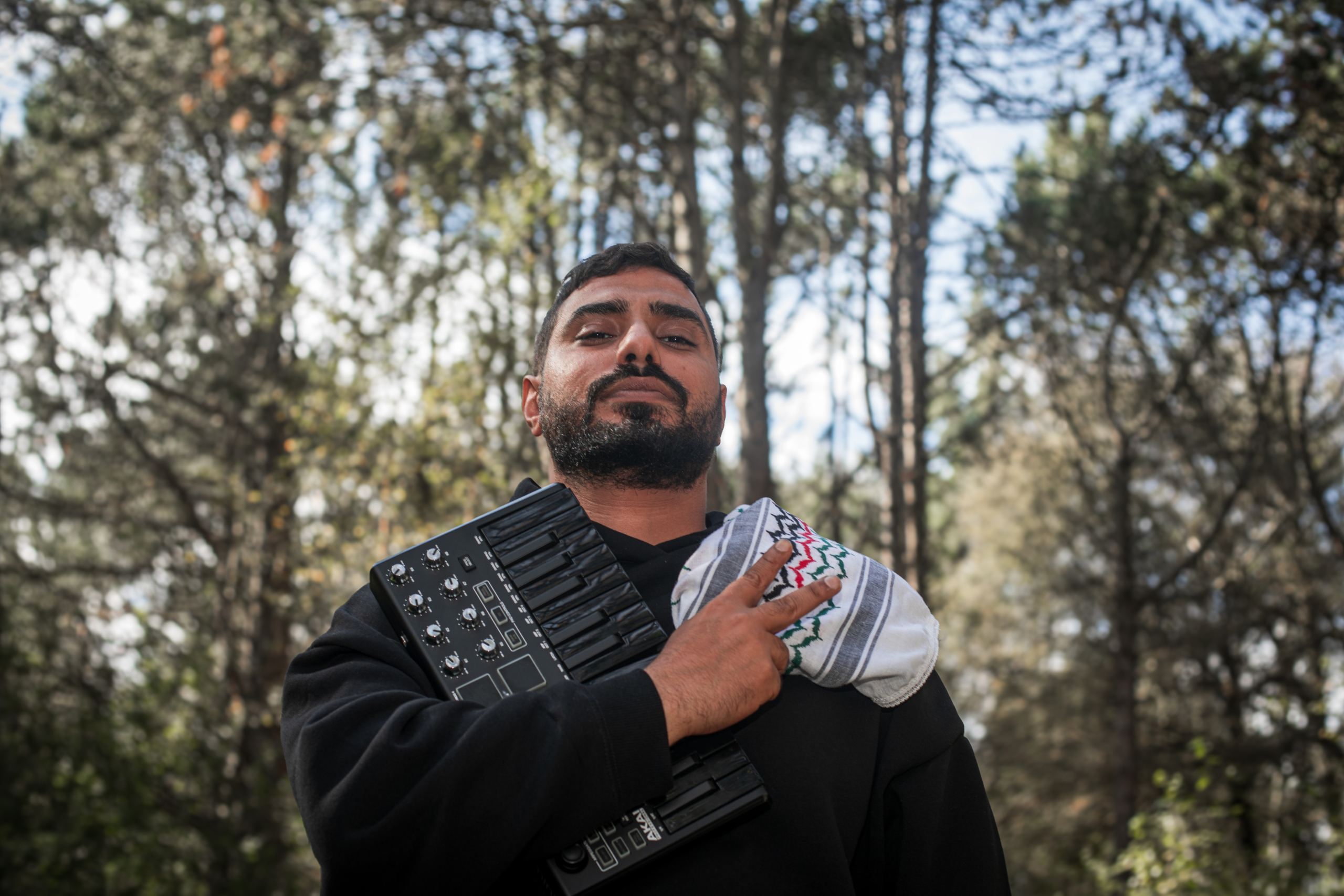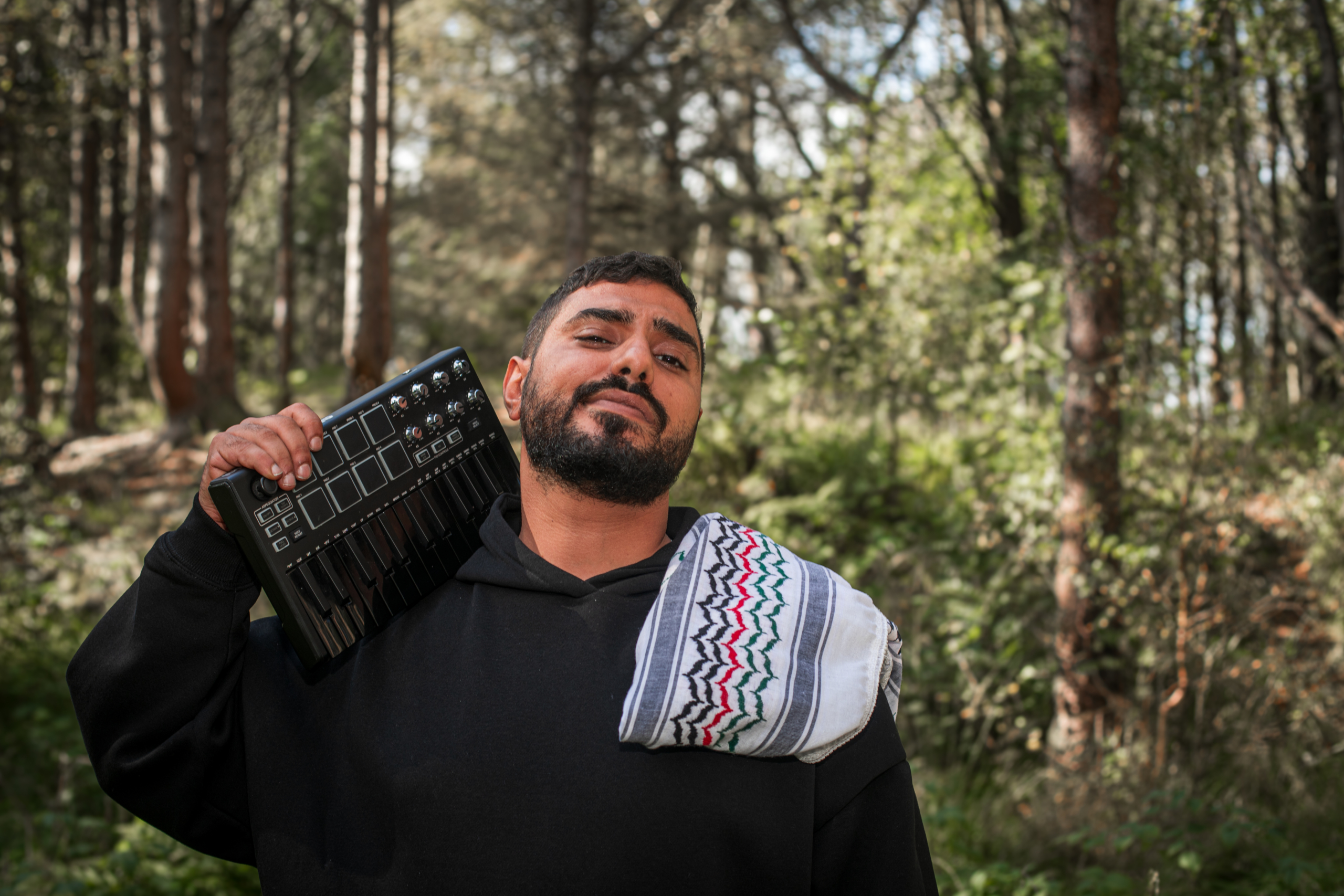“Music Has One Real Power”: Palestinian Rapper Elsusi on Exile, Resistance and the Survival of Gaza’s Art Scene
When Mohammed Elsusi speaks about home, he doesn’t talk about walls or land.
“After losing everything in Gaza, I realized that ‘home’ is not just walls or land. It is my friends, my people, and my memories.”
“Stones and land can always be rebuilt, but nothing can ever compensate for the lives taken, the pain endured, and the countless tears we have shed as Palestinians from Gaza.”
Known on stage simply as Elsusi, the 32-year-old hip-hop artist, producer, and designer from Gaza is now living in Stavanger, Norway, under an ICORN residency for persecuted writers and artists. His journey from Gaza to Turkey, back to Gaza, then finally into exile in Europe reflects the larger story of Palestinian artists who have seen their careers broken by war, censorship, and displacement.
Gaza’s health authorities say more than 63,000 people have been killed since the war began in October 2023, representing nearly three per cent of the territory’s population. More than 18,000 of the dead are children, with thousands more still missing beneath the rubble. A further 161,000 have been wounded, making Gaza one of the deadliest battlefields of the 21st century.
Nearly the entire population has been displaced, many of them multiple times. On 22 August 2025, a UN-backed body formally declared a famine in Gaza.
The Committee to Protect Journalists (CPJ) says at least 189 reporters and media workers have also been killed during the conflict. According to the United Nations, 1.9 million people were displaced in Gaza by October 2024, out of a population of 2.2 million.
Among those forced to flee was hip-hop artist Elsusi. After months of displacement, he left Gaza with his family and in May 2024 arrived in Norway, where he took up an ICORN residency in Stavanger, a designated City of Refuge for persecuted writers and artists.
“A concentration camp broadcast live”
For Elsusi, Gaza is not only a prison but it is also a graveyard for futures.
“The world doesn’t see that we are simply human beings who love life and want to live in dignity,” he says. “It doesn’t see that three generations have lost their future, that we are trapped in a concentration camp facing ethnic cleansing, starvation, and genocide broadcast live.”
He rejects the narrative that strips Palestinians of their humanity: “The world has turned victims into criminals and granted impunity to the perpetrators, twisting justice into a tool in the hands of those who claim to be ‘the chosen people.’”
Elsusi is not alone. Since October 2023, more than 45 musicians and artists from Gaza have been killed, many of them young. Others remain trapped, silenced, or in exile.
“Some have stopped working, others are silenced in exile, and many are still living through the genocide, trying to make their voices heard through art as a way to survive,” he explains.

Hip-hop as resistance
In Gaza, even before the war, music was restricted. Elsusi’s former band, Revolution Makers, was banned from performing by Hamas in 2017. He was arrested and interrogated repeatedly for his lyrics. But he insists that hip-hop carries a special power.
“What’s powerful about hip-hop is that you can enjoy the message because it’s rhymed, and at the same time you feel the music, full of movement and energy. that pushes you to act, not just to listen,” he says. “That’s why hip-hop remains youthful, dynamic, and a force that charges you to do something.”
Criticism without fear
Elsusi has drawn unwanted attention for criticising not only the occupation but also Palestinian authorities. He does not apologise for that.
The root cause of all our suffering and genocide is the occupation, which has lasted for 77 years. Everything else is a consequence of it.
“The root cause of all our suffering and genocide is the occupation, which has lasted for 77 years. Everything else is a consequence of it,” he says.
“But I criticize whoever has the responsibility and the power to change our miserable reality, Hamas, Fatah, NGOs, cultural institutions. Unfortunately, we live under a system fully dependent on foreign aid, exploiting people’s blood, and corrupted to the core.”
His criticism of Hamas is personal. “When it comes to Hamas, my criticism is stronger because I lived in Gaza, so naturally, most of my direct experience and suffering comes from what had the most immediate impact on me as a human being in that place.”
Exile and its dissonance
For Elsusi, exile has changed both his perspective and his sound.
“In exile, music feels limitless. Every concert, every club, you see people dancing with love, singing every lyric, it makes you feel alive,” he says. “My music, however, often carries sadness and pain. I try to blend joy with sorrow, but sometimes the mix feels dissonant or even out of place.”
Norway, however, has given him freedoms he never experienced in Gaza. “Here I can demand my rights, I can grieve and celebrate, I can even express love for a woman, things that were almost impossible in Gaza, even though I tried despite everything.”
Protecting Gaza’s creative lighthouse
Despite his own struggle to rebuild his career, Elsusi devotes much of his energy to keeping Gaza’s music scene alive.
“I do everything I can every day to support other artists from Gaza, to help them produce, to create opportunities for them, and sometimes to pressure European and international institutions to assist my colleagues in surviving this madness,” he says.
“I don’t want this scene to be destroyed, because it is a creative lighthouse that preserves Gazan and Palestinian identity.”
This dedication comes at a personal cost. “I dedicate myself fully to this work at the cost of my personal life until the genocide ends.”
A message to Gaza’s youth
Asked what advice he has for young Gazans, his answer is sharp: “Our only option as young people from Gaza is to be creative in our survival through learning, studying, and connecting with the outside world in every way we can, and by expressing ourselves culturally and artistically. If we don’t put all our energy into surviving and creating, our identity will not last. It will become just folklore, celebrated only as a reminder of our tragedy.”
“Migration, fear, or despair will not help us. They will only strip us of our identity. Yes, it is painful that we must work harder than the rest of the world just to be recognized, but we have no other choice. To survive, we must be successful and creative.”
“Music has one real power”
At times, the burden weighs heavily. But Elsusi insists there is hope, found in unexpected places.
“I find hope in the hearts of the Norwegians I meet, who tell me again and again: ‘Your music touched us, please keep going,’” he says.
“They are part of the reason I survived, and that gives me a responsibility both toward my people and toward the opportunities I’ve been given here in Norway.”
He concludes: “Music has one real power: to enlighten people’s minds.”
In late September, Elsusi released a new song, “ENJO”, from his upcoming album Living with Dignity. The track is available to stream online: https://www.youtube.com/watch?v=PwHEXxcbhRU





 Photo: PEN Norway
Photo: PEN Norway